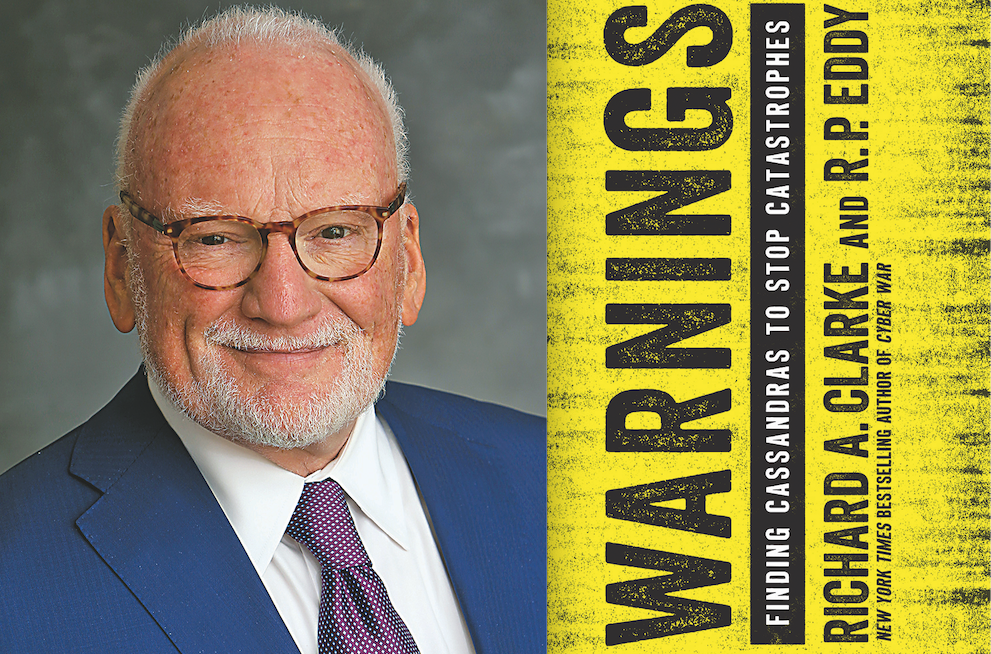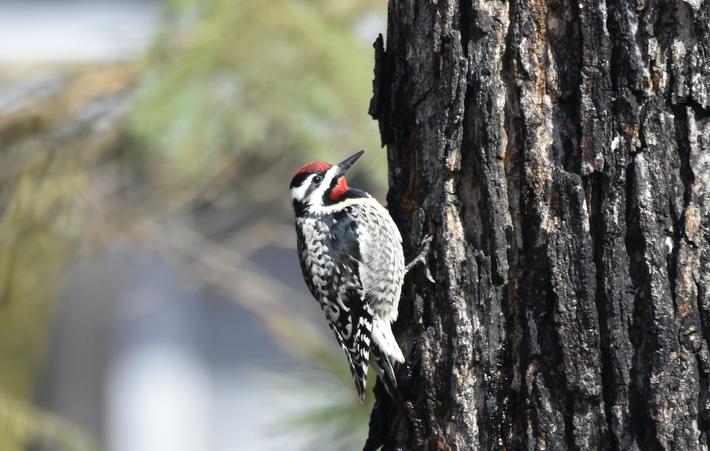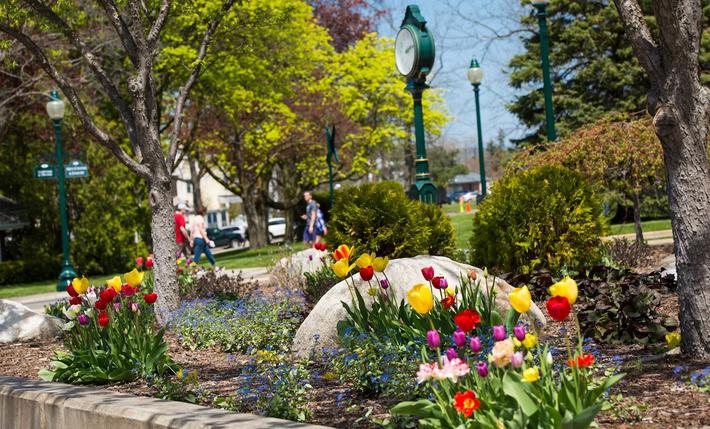
National Security Expert Richard A. Clarke Weighs In
"Warnings" co-author coming to TC in November
By Clark Miller | Nov. 3, 2018
Dire predictions abound in this era of 24/7 news coverage and punditry in real time. The question is: whose opinions should we trust?
As part of the National Writers Series, one of America’s leading security experts, Richard A. Clarke, will appear at 7 pm Thursday, Nov. 15, at the City Opera House to help readers sort out fact from fiction.
Clarke, who served as an advisor to three U.S. presidents, will discuss the book he and his colleague R.P. Eddy recently published, “Warnings: Finding Cassandras to Stop Catastrophes” (Harper Collins Publishing). The subtitle alludes to the ancient Greek story of Cassandra, a Trojan princess who could see the future clearly (and accurately). Tragically for Troy, no one believed her prophecies.
Clarke and Eddy offer plenty of recent examples of Cassandra-like incidents. Some situations in which well-reasoned warnings went unheeded include our country’s hurricane preparedness (Katrina), the rise of Isis, the Fukushima Nuclear Disaster, Bernie Madoff’s Ponzi scheme, a deadly mine disaster in West Virginia, and an event that deeply affected millions of Americans, the 2008 Great Recession.
Being the shrill voice in the room is a tough job. Even with the facts solidly on her side, for example, Cassandra’s fellow Trojans saw her as a fearmongering madwoman. (Not surprisingly, her life ended poorly.)
So Why Don’t We Listen?
In "Warnings," Clarke and Eddy show that inertia, skepticism and political gamesmanship continue to leave the country open to real perils. They write that some — though not all — modern-day warnings deserve to be heard and tested, and they suggest a strategy for sorting out the real Cassandras from what they call the “Chicken Littles,” those pundits who simply crave attention.
Northern Express interviewed Richard Clarke to discuss how we might go about identifying true Cassandras and how science might help us deal with threats to the security of our democracy and environment.
Northern Express: You are a very public expert on threats to U.S. security. I have to ask: In light of the pipe-bomb scares, how do you feel about your personal safety these days?
Clarke: Let’s put it this way, I’m not opening any “presents” that come in the mail. [Uneasy laughter.]
Express: So how do we decide whom to trust, who is a real Cassandra with vital information to share, and who, to use your term, is a “Chicken Little”?
Clarke: First you find out if they are recognized experts in the field before they made the prediction. Second, determine if they collected data or conducted experiments that produced results that are transparent. Third, ask if the person has the shown their results to other experts. If other experts say you got it wrong, that clears out 90 percent of the Chicken Littles.
Express: Threats come in many forms. There’s a lot of talk here in Michigan and elsewhere these days about the negative effects of gerrymandering. You’ve spoken publicly about the problem. Why is it an important issue, and what can be done about it?
Clarke: Gerrymandering undermines public confidence in democracy, which is something Putin is doing wherever he can. We have to reinforce peoples’ trust in our democracy. The best way [to do that] is to take redistricting out of the hands of politicians. Demographic experts and artificial intelligence programs can produce better, more even-handed results.
Express: These days, though, there’s a trend by certain policy makers to downplay data-driven, scientifically-based policy decisions. Could that affect America’s ability to understand and heed important issues?
Clarke: When we degrade or criticize science or experts, we make worse decisions. For example, there was a tendency in Britain during the Brexit debate to say very emotionally, “We don’t care about experts anymore.” Of course, that’s every voter’s choice. But as experts predicted, it’s becoming clearer every day that many people will lose jobs, and wages will stagnate.
Express: You place a lot of faith in science. But science often frustrates non-scientists. A simple example is red wine. First, it’s supposedly bad for you. Later, researchers said that in moderation, it’s good for your heart. Now the pendulum is swinging back and some scientists again think it’s bad for you. Wine didn’t change. But scientists’ opinions did. The point is, with all this waffling, what are we to believe?
Clarke: Science is a continuous process. It’s iterative. Conclusions made one year can change when different information comes in. But that’s good. We want people to question things. Science changes its opinions. But that’s how you make progress. Nothing is static.
Express: And how does this play out in identifying major risks?
Clarke: When a Cassandra comes along and challenges conventional wisdom, they’re an outlier. But three or four years later their opinion [might be considered] midstream. What we suggest in our book is that someone can be an outlier in her or his opinion, but that doesn’t mean they are wrong. It means we should test it and see if in time the consensus view supports that opinion.
Express: What is the global threat you worry the most about — one that, in your opinion, is not being adequately addressed?
Clarke: It’s sea level rises. Of course, that’s a subset of climate change. I focus a lot on rising sea levels because it’s happening a lot faster than experts predicted. And we still don’t know exactly how fast [it will happen], or how far [it will reach]. But it’s likely that during the life of [today’s] high school students it will destroy major cities. That includes Miami, sections of New York City, large swaths of Boston, Norfolk Naval Base. And that’s just the East Coast.
Express: You’ve written about one particularly vocal Cassandra, climatologist James Edward Hansen, who for years has sounded the alarm about this problem. So it would seem that there is some level of broad awareness.
Clarke: Yes, but we should have plans for dealing with the problem. Instead, we continue to put up high-rise buildings with 50-year financing. [Those structures] won’t even be around by then. And a lot of people in flood zones will lose their homes. In the book, we use the term "Magnitude Problem" — something that is so big that nobody wants to deal with it. Instead, we stick our heads in the sand.
Express: You’ve suggested taking the scientific approach to evaluate Cassandra warnings. But it takes a lot of time to conduct further research and a peer review of data and conclusions. In situations like rising sea levels, doesn’t there comes a time when a quicker response is needed?
Clarke: There’s another term we use in the book. It’s "Scientific Reticence," which means that scientists are sometimes too devoted to the scientific process. Jim Hansen was criticized for not following the scientific method.
Express: How did he defend those charges?
Clarke: Hansen’s response was that if we wait until his ideas are tested, we’ll all be wearing scuba masks. So, yes, sometimes you have to take measures before someone can prove you wrong or right.
Tickets
National Writers Series presentations take place at 7 p.m. at City Opera House in Traverse City. Doors open at 6pm. For tickets, go to www.cityoperahouse.org; call (231) 941-8082, ext. 201, Monday-Friday; or visit the City Opera House box office at 106 E. Front St.
Trending

East Jordan Remembers
East Jordan is gearing up for Memorial Day observances on Monday, May 27, starting at 6am with coffee at American Legion H... Read More >>
A Birder's Paradise
The Beaver Island Birding Trail celebrates its annual Birding Foray May 24-26. The weekend consists of multiple field trip... Read More >>
What to Do This Memorial Day Weekend, from Parades to BBQs to Concerts
Memorial Day Weekend, a time to honor and remember those who have served and fallen in the United States Armed Forces, has... Read More >>


